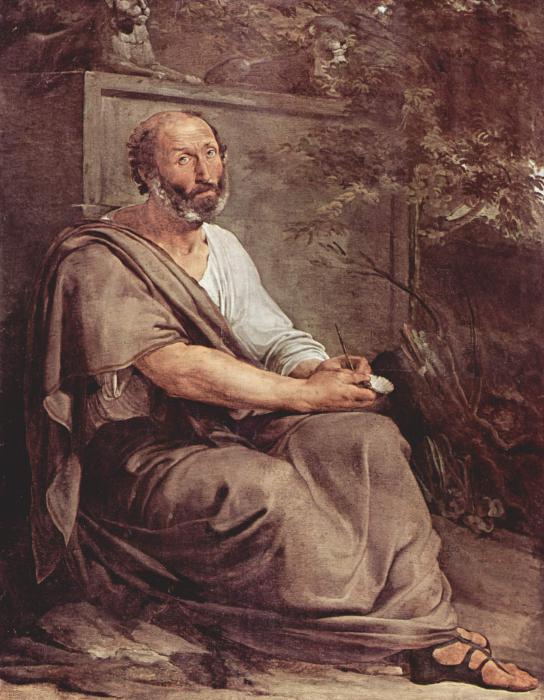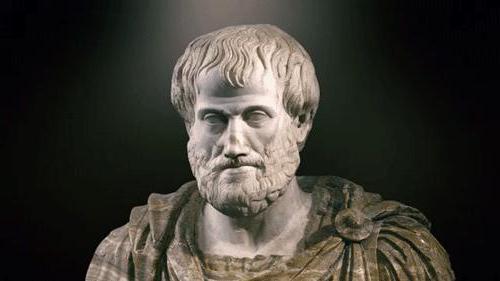Aristotle, as a scientist and a great ancient Greek philosopher, is known to many: his name is known to every person. His life was interesting and eventful, and his work made an invaluable contribution to science.
Friend and mentor
The greatest ancient Greek thinker Aristotle, who in biology and philosophy left a considerable mark, was born in 384 BC. e. in the Thracian city of Stagira. In 368 BC e., while still very young, he goes to Athens, where he becomes a student of the Academy led by Plato. In Plato, Aristotle, as a scientist, found an experienced mentor and elder friend whom he admired and whose influence he experienced until the end of his life. They communicated closely until the death of Plato in 348 or 347 BC. e.
The theory that Aristotle was an implacable opponent of Plato during his presence at the Academy, disputed the supremacy of his ideas. In fact, Aristotle had been at the Academy for twenty years, and it would hardly have been possible if his ideas were significantly different from the views of Plato or contradicted the general course of his thoughts.
After the academy
After the death of a teacher, Aristotle leaves the Academy in Athens in order to establish its branch in the city of Assos in Asia Minor Troas. Here he established friendly relations with the local tyrant Hermias, who two years later was accused by the Persians of disobedience and executed. In this regard, Aristotle was forced to move to the island of Lesbos, in the city of Metilena. It was during this period, in Assos and Methylene, that his own philosophical ideas began to formulate and take shape.
Aristotle and Alexander the Great
Around 343 BC e. the king of Macedonia Philip offers Aristotle the position of educator of his son and heir Alexander. It was the wise instructions of Aristotle that had a decisive influence on the formation of the personality of the future great commander. Grateful Alexander, as a sign of deepest appreciation and respect, rebuilt the hometown of his mentor Stagiru, destroyed during Philippe's campaigns.
Own school
After the accession of Alexander to the Macedonian throne in 336 BC. e. Aristotle left the post of educator and went to Athens, where he created his own school - Likey (located next to the sanctuary of Apollo Likey, Likey), also known as Περίπατος ("covered gallery" where lectures were given). Her listeners were called peripatetics. Aristotle Leake was a true research community. It had its own library and staff of teachers who regularly delivered lectures.
In 323 BC e. Alexander the Great died. The population of Athens, trying to break out of Macedonian rule, opposed Aristotle. He was forced to leave and settle in the city of Chalkida on the island of Euboea, where he passed away a year later.
Periods of creativity
In general, Aristotle's science is divided into three periods:
- The "academic" period, the time of communication with Plato. Then the dialogue “Evdem” was created, where Aristotle, as a scientist, agrees with Plato’s idea of knowing how to remember Ideas contemplated before birth, and “Protreptic” - a letter to Themis of Cyprus, in which the author, a follower of the theory of Plato’s forms, says that the real life of the soul begins after the death of the body. Also at this time, perhaps, work was begun on Physics and On the Soul, as well as some work on logic.
- The period of life in Assos and Methylene. This should include the dialogue “On Philosophy”, where Aristotle, who at that time had not yet made any discoveries in biology, calling Platonism the modern peak of the development of philosophy, nevertheless criticizes the theory of forms. Here Aristotle already comes up with the idea of God as the "motionless prime mover" of the world. During this period, he also leads work on "Metaphysics" and "Politics", creates the "Evdemian Ethics".
- Teaching and research time under the vaults of Likey. In this period, it is determined what Aristotle discovered over the years of his life. His goal is to put philosophy on a reliable and strong foundation: he systematically conducts diverse, detailed research in the field of nature and history. The pedagogical works (lectures) of Aristotle of that time were preserved and were published in the 60s BC. e. Andronicus of Rhodes. So "Metaphysics" is a set of lectures delivered at Likey at different times. The name “Metaphysics” reflects the place of this work in the collection of works of Aristotle, since it is located after the “Physics” (Greek. Μετα - “after”). But still, its content is metaphysical in the modern sense - if Physics addresses the problems of being subject to movement, Metaphysics is devoted to higher principles and root causes. The “Physics” itself, that is, the body of Aristotle’s texts on natural sciences and natural philosophy, also belongs to the third period. This includes “About the Soul” - the psychological theory of Aristotle, work on ethics (“Nikomakhov Ethics”, “Big Ethics”), political theory (“Politics”), “Rhetoric”, “Poetics”.

Systematization of science
Aristotle as a scientist also systematized philosophy, dividing it into the following areas of knowledge:
- Theoretical philosophy. It seeks to achieve pure knowledge, to knowledge in itself, and not to any practical results. Theoretical philosophy includes physics (the study of material, changing objects), mathematics (studies the immutable, but inseparable from the material) and metaphysics (refers to separated from the material, transcendental and motionless).
- Practical philosophy. It includes mainly political science, as well as a number of disciplines that Aristotle considers subordinate and auxiliary to politics: economics, strategy, rhetoric.
- Poetic philosophy. Includes ethics and aesthetics, this also includes Aristotle's theory of art.

Aristotle's contribution to the treasury of world civilization is difficult to overestimate. What Aristotle discovered can be listed for a long time. Many of his theories migrated to the philosophy of the Neoplatonists and medieval philosophy. The terms introduced and used by Aristotle, to this day are the basis of the philosophical dictionary of any of the languages existing in the world.